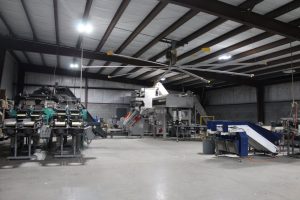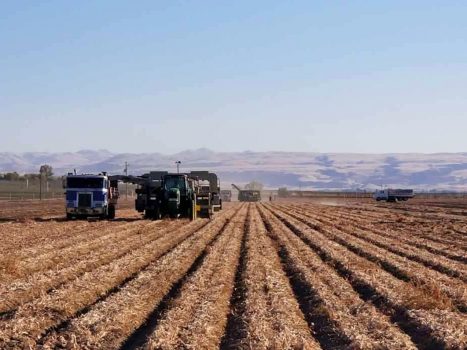By Jason Vee
Saying that onion business in the summer is difficult is a profound statement. The competition for reefer freight peaks for the year. We offset that by loading flatbeds and vented vans, and that doesn’t always feel like an improvement.
There is heat, rain and sometimes hail and crop damage to contend with. The challenges come from all sides. The best way I know to contend with the challenges of June and July onions is to team up with someone who faces these problems calmly, objectively, and actively seeks out solutions.
Stormy Adams of Shiloh Produce in Hatch, NM, is that guy.
Stormy, born in West Plains, MO, on Jan. 10, 1962, moved to New Mexico when he was very young. The Adams family started growing onions in 1953 as part of a diversified plan that included alfalfa, wheat, corn for silage, chiles, pecans and cotton. In 1986 Shiloh Produce, Inc was formed.

Adams Produce, Inc., Shiloh Produce Sales
Today’s operation has multiple facets. First, Shiloh Produce has partnered with Horizon Farms in Holtville, CA. That partnership creates a window of opportunity to kickstart the summer season around April 20 and build momentum leading up to the New Mexico start date. Subsequently, Shiloh Produce also aligns itself with Adams Produce, Chile River and Covarrubias Farms.
“We’ve had an alliance with these companies for 30-plus years,” Stormy said.
He also stated, “We have an experienced staff that is passionate about the onion business.” Some of the key players who keep the gears moving at Shiloh Produce are Brian Folkman, who’s in charge of job coordinating and order disbursement among the three New Mexico sheds; Kyle Rice, who handles sales and account management; Trey Correa, who works in sales and food safety; Zach Adams in transportation; Amby Adams in accounting; Tara Adams in accounting; and Stormy Adams, company owner.
 When I asked Stormy about the number of onion varieties he uses, I was surprised how many and how short the duration can be for some of them. He said they go through approximately a dozen varieties in the California location and only three to five days per variety. The New Mexico operation goes through more than two dozen varieties across all colors, shipping as few as three days up to three weeks.
When I asked Stormy about the number of onion varieties he uses, I was surprised how many and how short the duration can be for some of them. He said they go through approximately a dozen varieties in the California location and only three to five days per variety. The New Mexico operation goes through more than two dozen varieties across all colors, shipping as few as three days up to three weeks.
Stormy said, “Onion varieties respond differently in all four of our growing regions. We have a unique situation in New Mexico being that we can start early varieties in June and July at 3,500 feet elevation and transition to Hatch at 4,100 feet, Las Uvas at 4,300 feet, and finally in Deming at 4,500 feet. Even though field proximities are less than 60 miles from area to area, the daytime and nighttime temperatures are substantially different.”
 He also weighed in on how those varieties have changed over the years. “When we first started growing onions, most varieties were open pollinated,” he said. “Varieties we grow today are all hybrid varieties, and those varieties are more uniform in shape, have better paper retention and color and have uniform maturity.”
He also weighed in on how those varieties have changed over the years. “When we first started growing onions, most varieties were open pollinated,” he said. “Varieties we grow today are all hybrid varieties, and those varieties are more uniform in shape, have better paper retention and color and have uniform maturity.”
I asked about organics, and Stormy said Shiloh there is an organic program in place at Horizon that starts April 20 and finishes June 15.
Considering the growing popularity of home delivery companies like Blue Apron and Home Chef, I was curious if that is having any effect on an onion shipper’s business profile. Stormy confirmed my suspicions.
“We have shifted our business from heavy retail to a better balance between retail and foodservice,” he said. “That’s about 60 percent foodservice and 40 percent retail. The trends are changing to a service industry, and therefore retail will flatline or lose market share.”
Regarding technology, I learned that Shiloh Produce and partners use drip irrigation on most fields for water conservation, fertilizer placement, fungicide and other nutrients. Adams said most of the tractors have GPS, and the operation has added a drone to the farm fleet for checking fields.
 Moving outdoors to indoors, I inquired about the shed technology, and Stormy said, “We are fully automated at all of our sheds in New Mexico. California is partially automated now, and we are working on a plan to fully automate there over the next three years.” When asked about atmosphere storage, Stormy said, “We do have controlled atmosphere storage at the New Mexico facilities. California has a curing facility but does not have a controlled environment – it’s ambient air curing only.”
Moving outdoors to indoors, I inquired about the shed technology, and Stormy said, “We are fully automated at all of our sheds in New Mexico. California is partially automated now, and we are working on a plan to fully automate there over the next three years.” When asked about atmosphere storage, Stormy said, “We do have controlled atmosphere storage at the New Mexico facilities. California has a curing facility but does not have a controlled environment – it’s ambient air curing only.”
Labor seems to be an issue across all industries, and the onion industry isn’t any different. Adams told me, “Labor is becoming a major issue in the packing sheds. We have been forced to automate at all the sheds in New Mexico, and the California shed won’t be far behind with minimum wage increases. Our onion business is labor intensive from the field harvest to the packing shed. Every acre grown is harvested with field workers.”
When I asked if he wanted to weigh in on any hot topics, Adams didn’t shy away. He said, “I’m an advocate of fair trade, not free trade. The H-2A program has benefited our business in terms of a reliable workforce that allows us to harvest the crop when it’s ready.” H-2A is a temporary work visa program specific to agriculture that allows employers to hire foreign guest workers to fill seasonal jobs like onion harvesting, and Stormy said, “The quality of work from the H-2A workers is exceptional.”
I also asked Stormy where he sees the onion industry in five years, and he expanded on the onion shipper business profile. “The market trends are shifting to a service industry,” he explained. “Individuals are less motivated to prepare meals at home because of the time involved. I see online grocery delivery as a steady business. The foodservice industry will continue to grow their business servicing restaurant trade, institutions, and prisons. And the retail industry will struggle to make headway in a very challenging merchandizing environment.”
He continued, “Packing innovations with creativity will pay nice dividends to packers. We will continue to have labor challenges, and therefore automation and computerization will be key to moving forward. Foreign policy will be detrimental to come commodities while helping others.”
Featured Image: Stormy with wife Amby Adams
Many thanks to Jason Vee for this week’s contributing story.


